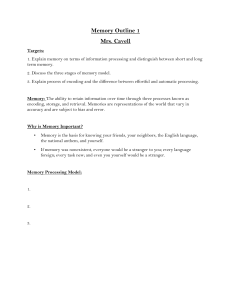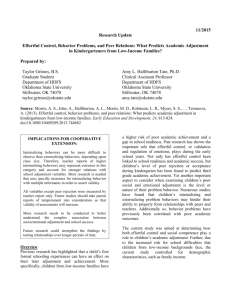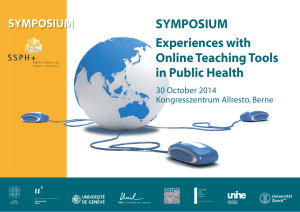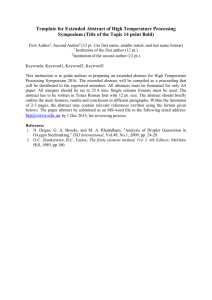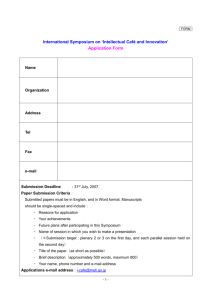Document
advertisement
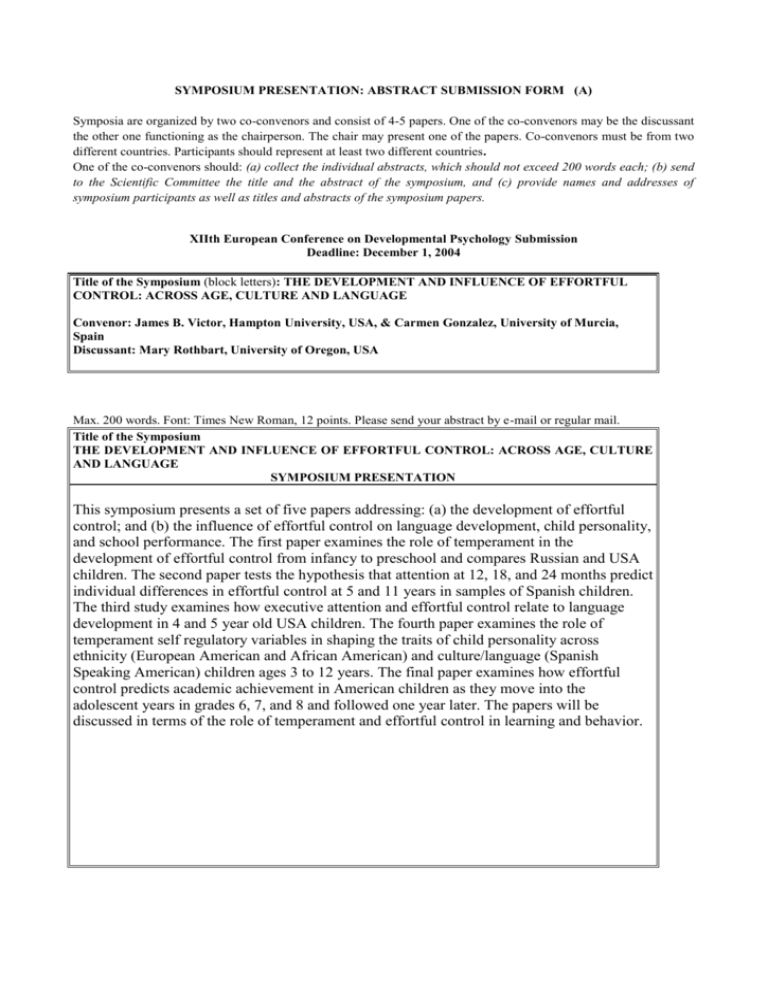
SYMPOSIUM PRESENTATION: ABSTRACT SUBMISSION FORM (A) Symposia are organized by two co-convenors and consist of 4-5 papers. One of the co-convenors may be the discussant the other one functioning as the chairperson. The chair may present one of the papers. Co-convenors must be from two different countries. Participants should represent at least two different countries. One of the co-convenors should: (a) collect the individual abstracts, which should not exceed 200 words each; (b) send to the Scientific Committee the title and the abstract of the symposium, and (c) provide names and addresses of symposium participants as well as titles and abstracts of the symposium papers. XIIth European Conference on Developmental Psychology Submission Deadline: December 1, 2004 Title of the Symposium (block letters): THE DEVELOPMENT AND INFLUENCE OF EFFORTFUL CONTROL: ACROSS AGE, CULTURE AND LANGUAGE Convenor: James B. Victor, Hampton University, USA, & Carmen Gonzalez, University of Murcia, Spain Discussant: Mary Rothbart, University of Oregon, USA Max. 200 words. Font: Times New Roman, 12 points. Please send your abstract by e-mail or regular mail. Title of the Symposium THE DEVELOPMENT AND INFLUENCE OF EFFORTFUL CONTROL: ACROSS AGE, CULTURE AND LANGUAGE SYMPOSIUM PRESENTATION This symposium presents a set of five papers addressing: (a) the development of effortful control; and (b) the influence of effortful control on language development, child personality, and school performance. The first paper examines the role of temperament in the development of effortful control from infancy to preschool and compares Russian and USA children. The second paper tests the hypothesis that attention at 12, 18, and 24 months predict individual differences in effortful control at 5 and 11 years in samples of Spanish children. The third study examines how executive attention and effortful control relate to language development in 4 and 5 year old USA children. The fourth paper examines the role of temperament self regulatory variables in shaping the traits of child personality across ethnicity (European American and African American) and culture/language (Spanish Speaking American) children ages 3 to 12 years. The final paper examines how effortful control predicts academic achievement in American children as they move into the adolescent years in grades 6, 7, and 8 and followed one year later. The papers will be discussed in terms of the role of temperament and effortful control in learning and behavior. SYMPOSIUM PAPER: ABSTRACT SUBMISSION FORM (A) XIIth European Conference on Developmental Psychology Symposium Paper Title of the Symposium (block letters): THE DEVELOPMENT AND INFLUENCE OF EFFORTFUL CONTROL: ACROSS AGE, CULTURE AND LANGUAGE Convenor: James B. Victor, Hampton University, USA, & Carmen Gonzalez, University of Murcia, Spain Discussant: Mary Rothbart, University of Oregon, USA Max. 200 words. Font: Times New Roman, 12 points. Please send your abstract by e-mail. Title of Symposium Paper: A Cross-Cultural Study of Infant Temperament: Explaining Preschool Effortful Control. Name(s): Masha Gartstein, Washington State University, USA*; Helena Slobodskaya, & Gennadij Knyazev, Siberian Branch of the Russian Academy of Medical Sciences, Russia; Brian Hunter, MS, Washington State University, USA Address of Institution(s): *Washington State University, Pullman, WA, 99164-4820, USA Tel: 509 - 335-4651 Fax: E-mail: gartsma@wsu.edu Effortful Control (EC) has been conceptualized as a dimension of temperament incorporating characteristics related to self-regulation (i.e., voluntary attention, inhibitory control) and associated with the development of executive attention skills. Whereas a great deal of research has focused on documenting the development of EC, there has been little systematic study of early precursors of EC. The present study was designed to examine infant temperament characteristics as potential predictors of EC in preschool across two countries: Russia and U.S.A. Specifically, contributions of Negative Emotionality (NE), Surgency/Positive Affectivity (SPA), and Orienting/Regulatory Capacity (ORC) measured in the first year of life were expected to explain Effortful Control in the preschool period. Hierarchical multiple regression analyses were conducted separately for U.S and Russian samples. Background characteristics were entered first, followed by temperament factors assessed during the preschool follow-up and infant temperament factors. For the U.S. sample, preschool NE (Beta=-.24; p<.01), infant SPA (Beta=.43; p<.01) and ORC (Beta=.25; p<.01) explained significant amounts of EC variance, whereas infant ORC (Beta=.35; p<.01) was the single significant predictor of preschool EC in the Russian sample. Results of this study support the importance of early appearing regulation capacity in contributing to the development of EC. SYMPOSIUM PAPER: ABSTRACT SUBMISSION FORM (A) XIIth European Conference on Developmental Psychology Symposium Paper Title of the Symposium (block letters): THE DEVELOPMENT AND INFLUENCE OF EFFORTFUL CONTROL: FROM INFANCY TO ADOLESCENCE Convenor: James B. Victor, Hampton University, USA, & Carmen Gonzalez, University of Murcia, Spain Discussant: Mary Rothbart, University of Oregon, USA Max. 200 words. Font: Times New Roman, 12 points. Please send your abstract by e-mail. Title of Symposium Paper: Executive attention in infancy supports the development of Effortful Control through childhood Name(s): Jose Antonio Carranza, Carmen González, & Angelines Vilar Address of Institution(s): University of Murcia, Spain Tel: Fax: E-mail: cgonzales@um.es Late in the first year of life, the maturation of the Anterior Attentional Network leads to the emergence of an executive function, linked to the goal-oriented, planned behavior, and permitting the child to engage and persist for longer in playing with objects. It has been proposed that this executive attention supports Effortful Control (Rothbart & Posner, 1992), that is, the ability to inhibit a dominant response to perform a subdominant response. This skill is considered necessary to regulate one’s behavior in response to the cognitive, emotional and social demands of specific situations. If attention span at the first birthday is controlled by the executive attentional network, then, individual differences in effortful control in childhood can be predicted from so early in infancy. To test this hypothesis, we assessed a group of children from infancy through childhood, and administered temperament questionnaires to parents at different ages. As expected, Attention/persistence at 12, 18, and 24 months predicted individual differences in Effortful Control dimensions at 5 and 11 years old. Also, higher scores in Attention/persistence at 12, 18, and 24 were consistently associated with a lower negative emotionality at 5 and 11 years, supporting the role of the executive attentional network in emotion regulation. XIIth European Conference on Developmental Psychology Symposium Paper Title of the Symposium (block letters): THE DEVELOPMENT AND INFLUENCE OF EFFORTFUL CONTROL: FROM INFANCY TO ADOLESCENCE Convenor: James B. Victor, Hampton University, USA, & Carmen Gonzalez, University of Murcia, Spain Discussant: Mary Rothbart, University of Oregon, USA Max. 200 words. Font: Times New Roman, 12 points. Please send your abstract by e-mail. Title of Symposium Paper: Effortful Control Dimensions, Executive Attention, and Language Development: Relationships in Early Childhood for Diverse Children Name(s): Evelyn Reed-Victor, Virginia Commonwealth University*; Lynn E. Pelco, College of William & Mary; and Brittany Myatt, Hampton University, USA *Address of Institution(s): *Virginia Commonwealth University, PO Box 842020, Richmond, VA 23284-2020 Tel: 804-827-2653 Fax: 804-828-1326 E-mail: ereedvic@vcu.edu Self-regulation and language development are important for young children’s school adjustment and achievement (Shonkoff & Phillips, 2000). This study examines how dimensions of effortful control and executive attention relate to language development in 4-5 year old children (N=100). Parents rate child temperament and personality using the Child Temperament Personality Questionnaire (Victor, Rothbart, & Baker, 2001), which includes personality factors of Internalizing Negative Affectivity, Sociable Extraversion, Unsocialized Stimulation Seeking, Openness to Experience, and Conscientiousness, as well as Effortful Control scales of Attention Focusing, Inhibitory Control, Perceptual Sensitivity, and Falling Reactivity. Children’s Executive Attention is measured with the Attention Networks Test (Fan, McCandliss, Sommer, Raz & Posner, 2002; Posner, 2000), computer-based stroop tasks which measure orienting, vigilance, and executive networks. Language development is measured with the Individual Growth & Development Indicators (McConnell, Priest, Davis, & McEvoy, 2002) of vocabulary development and phonological awareness (rhyming and alliteration), through picture naming and matching in specified time limits. Parent-rated Effortful Control and child ANT performance contribute significantly to personality dimensions that are important in school adjustment and achievement. Further, Effortful Control dimensions, Inhibitory Control and Attention Focusing, are significantly related to vocabulary skills, and ANT interference scores are significantly related to vocabulary and phonological awareness. XIIth European Conference on Developmental Psychology Symposium Paper Title of the Symposium (block letters): THE DEVELOPMENT AND INFLUENCE OF EFFORTFUL CONTROL: FROM INFANCY TO ADOLESCENCE Convenor: James B. Victor, Hampton University, USA, & Carmen Gonzalez, University of Murcia, Spain Discussant: Mary Rothbart, University of Oregon, USA Max. 200 words. Font: Times New Roman, 12 points. Please send your abstract by e-mail. Title of Symposium Paper: The Role of Temperament Self-regulatory Variables in Shaping Child Personality: Across Ethnicity and Language Name(s): James B. Victor, Hampton University*; Fatimah Rashad, Hampton University; & Angelines Vilar, University of Murcia. Address of Institution(s): *Hampton University, Hampton, VA 23668 Tel: 757-727-5529 Fax: 757-727-5131 E-mail: james.victor@hamptonu.ecu This paper examines the role of temperament self regulatory variables (attentional focusing, Inhibitory control, perceptual sensitivity, and soothability) in shaping child personality traits (Internalizing Negative Affectivity, Sociable Extraversion, Unsocialized Stimulation Seeking, Conscientiousness, and Openness to Experience). Parents of children 3 to 12 years old rated their children on the Child Temperament and Personality Questionnaire (CTPQ). The samples consist of European American children (N = 487); African American children (N = 298); and Spanish Speaking American children (N = 198). The self regulatory dimensions were regressed against the personality factors of CTPQ. Soothability was related negatively to Internalizing Negative Affectivity (INA), less predictably to Sociable Extraversion, and to Unsocialized Stimulation Seeking (USS). Perceptual Sensitivity was strongly related to Openness to Experience. Attention Focusing and Inhibitory Control were related strongly to Conscientiousness and at lower levels to Openness. Inhibitory control was strongly related to Unsocialized Stimulation Seeking. The general patterns for broad traits across ethnicity are remarkably similar; however several interesting subscale differences will be discussed. XIIth European Conference on Developmental Psychology Symposium Paper Title of the Symposium (block letters): THE DEVELOPMENT AND INFLUENCE OF EFFORTFUL CONTROL: FROM INFANCY TO ADOLESCENCE Convenor: James B. Victor, Hampton University, USA, & Carmen Gonzalez, University of Murcia, Spain Discussant: Mary Rothbart, University of Oregon, USA Max. 200 words. Font: Times New Roman, 12 points. Please send your abstract by e-mail. Title of Symposium Paper: Effortful Control Predictive Ability: Adolescent School Performance Name(s): Spencer Baker, Hampton University Address of Institution(s): Hampton University, Hampton, VA 23668 Tel: 757-727-5128 Fax: 757-727-5131 E-mail: spencer.baker@hamptonu.edu Individual differences in Effortful Control have been discussed as having important consequences for developing personality and associated with approach, anxiety, conscientiousness, and agreeableness (Ahadi & Rothbart, 1994). Implications of the attentional mechanisms underlying Effortful Control has been shown for concurrent social development in toddlers (Kochanska, Murray, & Harlan, 2000) and stability over time (Rothbart, Ellis, Rueda, & Posner, 2003). Recent studies have shown relationships between Effortful Control, conscientiousness, and agreeableness, in adolescent academic adjustment (Hair & Graziano, 2003) and academic performance (Baker, 2004). Data will be presented from two adolescent samples, first showing the relationship between Effortful Control and intelligence as measured by a norm-referenced standardized test, Stanford 9 TA. The second study, will present data regarding the stability and change over one year for Effortful Control and how Effortful Control predicts academic achievement as measured by grade point average The Child Temperament and Personality Questionnaire (CTPQ), self report was used in both studies (N=300) children in the 6th, 7th, and 8th grades. Discussion will include how Effortful Control predicts adolescent academic achievement over time and how Effortful Control may be the foundation for both conscientiousness and agreeableness.
